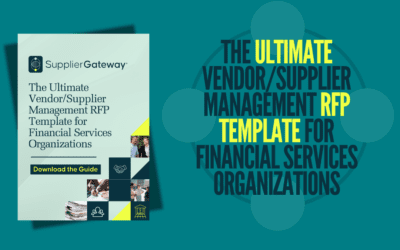If you’re a hospital or healthcare system looking to diversify your suppliers, it’s important to understand what supplier diversity certifications are and how potential suppliers obtain them. Supplier diversity certifications are a way for your organization to identify diverse companies and organizations you want to include in your supplier base, as well as a way to guarantee that the diversity information you have for your suppliers is up-to-date and accurate.
Diverse Supplier Classifications
So, what is a diverse supplier? A diverse supplier is a business that is owned and operated by an individual or group of people from a traditionally underrepresented or underserved group.
In the US, there are eighteen categories used to identify diverse businesses:
Disabled Owned – A business that is a least 51% owned by one or more disabled persons who control and operate the business. Control in this context means exercising the power to make policy decisions and operate means being actively involved in the day-to-day management of the business.
Disabled Veteran Business Enterprise (DVBE) – This term is used by the State of California, public utilities, and many private corporations to designate a company that is owned (at least 51%) and controlled by a Veteran with a Service-Connected Disability rating of at least 10% from the Department of Veterans Affairs. Additionally, the Veteran must reside in the state of California.
Disadvantaged Business Enterprise (DBE) – A business that is usually certified by a federal, state, or local government agency as having met all of the government standards that award eligibility, but may include women, minorities, disabled, and other disadvantaged as a result of economic disadvantages with respect to education, employment, residence or business location or social disadvantage and lack of business training.
Disadvantaged Veteran Enterprise (DVE) – A business that is a small business concern owned and controlled by veterans, where not less than 51% is owned, controlled, and managed by veterans.
Historically Black Colleges / Universities & Minority Institutions (HBCU/MI) – Historically Black and minority colleges and universities that the government recognizes as legitimate set-aside business opportunities.
HUBZone Certified – A business that is operating in a certified historically underutilized business zone. There are 7,000 qualified census tracts (HUD) and 900 qualified non-metropolitan counties.
LGTB Owned (LGBT) – A business that is at least 51% owned and operated by an LGTB person(s).
Minority-Owned – A business that is at least 51% owned by, and whose management and daily business operations are controlled by, one or more members of a socially and economically disadvantaged minority group, namely U.S. citizens who are African Americans (Black), Hispanic Americans, Native Americans, Asian-Pacific Americans, Alaskan Native Americans, and Indian Sub-Continent Americans.
Minority Business Enterprise (MBE) – A Minority Business Enterprise usually certified by a federal, state or local governmental agency as having met all of the government standards that award eligibility.
Service-Disabled Veteran (SDV) – A business that is owned by one or more veterans with a disability that is service-connected. The term “service-connected” means, with respect to disability, that such disability was incurred or aggravated, in the line of duty in the active military, naval or air service. (38 U.S.C. ‘101(16).
Small Business – A business considered eligible for assistance from SBA as a small business is one that is organized for profit, with a place of business located in the United States. It must operate primarily within the United States or make a significant contribution to the U.S. economy through the payment of taxes or the use of American products, materials, or labor. Together with its affiliates, it must meet the numerical size standards as defined in the Small Business Size Regulations, 13 CFR 121
Small Disadvantaged Business (SDB) – Small Disadvantaged Business: New certification eligibility criteria established by the SBA effective 7/1/99. All firms must be certified by one of the SDB Certification Agencies designated by the SBA. To qualify must be a small business, not exceed standards for Primary SIC, meet Contracting Officers’ assigned SIC code, be a U.S. Citizen, and be 51% owned and controlled by one or more Socially & Economically Disadvantaged Individuals. The SBA classification is based on a Preponderance of the Evidence Clause”. This SDB Certification is good for 3 years.
Veteran Business Enterprise (VBE) – Under SBA Guidelines Small Business Act (PL 85-536) as amended states: Small Business Concerns owned and controlled by veterans not less than 51% owned by one or more veterans and in the case of a publicly owned business not less than 51% of the stock is owned by one or more veterans.
Veteran Owned – A business that is a least 51% owned by one or more veterans, who control and operate the business. Control in this context means exercising the power to make policy decisions and operate means to be actively involved in the day-to-day management of the business. The term “veteran” (38 U.S.C.’101(2)) means a person who served in the active military, naval, or air service, and who was discharged or released therefrom under conditions other than dishonorable.
Vietnam Veteran – A business that is a least 51% owned by one or more Vietnam Veterans who served between 1/1/59 and 5/7/75 and have control and operate the business. Control in this context means exercising the power to make policy decisions and operate means to be actively involved in the day-to-day management of the business.
Women-Owned – A business that is at least 51% owned by, and whose management and daily business operations are controlled by one or more women who are U.S. citizens.
Woman Business Enterprise (WBE) – A Woman Business Enterprise is usually certified by a federal, state, or local government agency as having met all of the government standards that award eligibility.
8(A) Designation – The 8A designation is given to small companies owned by socially and economically disadvantaged persons, so that they may bid and obtain federal government contracts and other assistance to develop their business. The business owner must be eligible under the same rules and guidelines set down by the federal government.
Internationally, there are five classifications, but these will vary by country:
Disabled Owned – A business that is a least 51% owned by one or more disabled persons who control and operate the business. Control in this context means exercising the power to make policy decisions and operate means to be actively involved in the day-to-day management of the business.
LGTB-Owned – A business that is at least 51% owned and operated by one or more LGTB person(s)
Minority-Owned – A business that is at least 51% owned by, and whose management and daily business operations are controlled by, one or more members of a socially and economically disadvantaged minority group. Minority (ethnicity) is defined by country as the socio-economic under-represented. Intel does not require disclosure of ethnicity per the privacy policy. Disclosure of ethnicity is voluntary, not a requirement.
Veteran Owned – A business that is a least 51% owned by one or more veterans, who control and operate the business. Country exceptions: Israel, Taiwan
Women-Owned – A business that is at least 51% owned and operated by one or more women.
What Certifications Should My Supplier Diversity Program Accept?
Most supplier diversity programs accept certifications from third-party certifying agencies. There are several types of certifications available, including federal, state-level, local, and non-governmental organization (NGO) certifications. The certification process typically requires suppliers to submit documentation, go through screenings and interviews, and may also include an on-site visit.
Ultimately the certifications your organization accepts will reflect the types of businesses you want to engage and do more business with.
Below is a list of certifying organizations that certify businesses on a national level:
- National Minority Supplier Development Council (NMSDC)
- African-American (Black), Asian-American, Native American, Alaskan Native American, Indian Sub-Continent American, or Hispanic-owned businesses
- Women’s Business Enterprise National Council (WBENC)
- Woman-owned businesses
- National Gay & Lesbian Chamber of Commerce (NGLCC)
- LGBT-owned businesses
- United States Hispanic Chamber of Commerce (USHCC)
- Hispanic-owned businesses
- Asian Pacific American Chamber of Commerce (APACC)
- Asian-American and Pacific Islander-owned businesses
- Native American Chamber of Commerce (NACC)
- Native American-owned businesses
- Vets First Certification Program
- Veteran-owned businesses
- Disability:IN
- Disability-owned businesses
- SupplierGateway
- African-American (Black), Asian-American, Native American, Hispanic, Woman, Veteran, and Disability-owned businesses.
It’s important to note that a single business can hold multiple certifications. If a business is owned by a lesbian Native American woman, that business would be eligible for four separate certifications—one from National Minority Supplier Development Council (NMSDC), one from Women’s Business Enterprise National Council (WBENC), one from Native American Chamber of Commerce (NACC), and one from SupplierGateway.
SupplierGateway’s Enhanced Digital Certification® is done entirely online and does not require a site visit. The approval process is expedited, with applications generally approved within 24 hours. This all-in-one certification certifies many different classifications with one certificate. Your organization can even sponsor Enhanced Digital Certification for your current suppliers. At $25 per year, it’s an affordable way to grow your organization’s diverse supplier roster and ensure that supplier diversity information remains accurate and up-to-date.
The Importance of Understanding Supplier Diversity Certifications for Hospitals and Healthcare Systems
Understanding supplier diversity certifications is an important step for hospitals and healthcare systems looking to diversify their suppliers. Understanding the certification process and choosing which certifications your program accepts will ensure that your program is engaging with suppliers that fulfill program requirements. Additionally, understanding certifications can help effect change within your organization’s current culture of supply chain management and help your organization’s supplier diversity program meet its goals.












